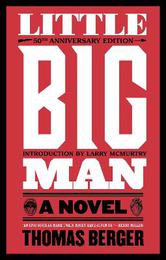
|
Little Big Man: A Novel
Paperback / softback
Main Details
| Title |
Little Big Man: A Novel
|
| Authors and Contributors |
By (author) Thomas Berger
|
|
Introduction by Larry McMurtry
|
| Physical Properties |
| Format:Paperback / softback | | Pages:480 | | Dimensions(mm): Height 208,Width 132 |
|
| Category/Genre | Westerns |
|---|
| ISBN/Barcode |
9780385298292
|
| Classifications | Dewey:FIC |
|---|
| Audience | |
|---|
|
Publishing Details |
| Publisher |
Bantam Doubleday Dell Publishing Group Inc
|
| Imprint |
Bantam Doubleday Dell Publishing Group
|
| Publication Date |
1 September 1989 |
| Publication Country |
United States
|
Description
LITTLE BIG MAN, was hailed by The Nation as a "seminal event... the most significant cultural and literary trend of the 1960's ." Believe it or not, Jack Crabb is 111 years old. He is also the son of two fathers, one white, the other a Cheyenne Indian chief who gave him the name Little Big Man. As a Cheyenne, Crabb feasted on dog, loved four wives, and saw his people butchered by horse-soldiers commanded by Custer. As a white man, he helped hunt the buffalo into extinction, tangled with Wyatt Earp, cheated Wild Bill Hickok--and lived through the showdown that followed. He also survivied the Battle of Little Bighorn, where he fought side by side with Custer himself--even though he'd sworn to kill him. The basis of a popular film, LITTLE BIG MAN, was hailed by The Nation as a "seminal event... the most significant cultural and literary trend of the 1960's ."
Author Biography
Thomas Berger, whom the Times Literary Supplement has called "one of the century's most important writers," is the author of twenty-three novels. Little Big Man has been published in more than fifty editions throughout the world.
Reviews"An epic such as Mark Twain might have given us."-Henry Miller "The very best novel ever about the American West."-The New York Times Book Review "Spellbinding . . . [Crabb] surely must be one of the most delightfully absurd fictional fossils ever unearthed."-Time "Superb . . . Berger's success in capturing the points of view and emotional atmosphere of a vanished era is uncanny. His skill in characterization, his narrative power and his somewhat cynical humor are all outstanding."-The New York Times
|